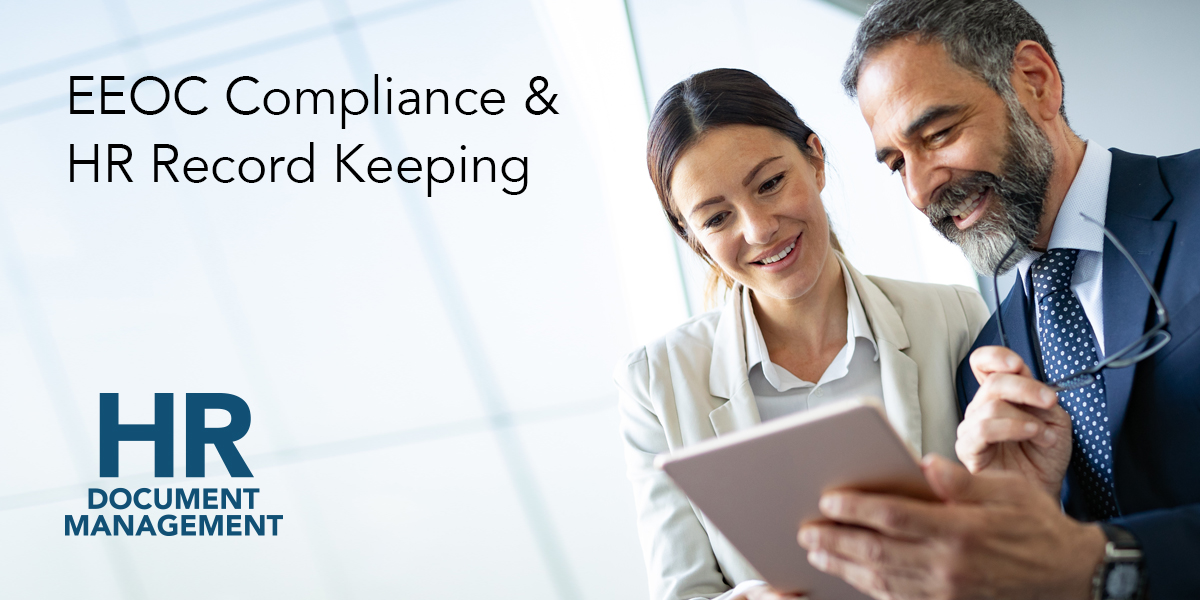It is the job of the Equal Employment Opportunity Commission (EEOC) to administer and enforce civil rights laws against workplace discrimination. To comply with these laws, employers and HR professionals must educate and train employees, implement strong policies and procedures, and maintain strict record keeping practices.
EEOC Compliance
It’s a challenge for employers and HR professionals to strictly follow the laws enforced by the EEOC. However, legal consequences can be severe, which is why EEOC compliance should be a high priority. Current, former, and prospective employees are all protected in various ways by EEO laws. It is important to understand everyone’s rights and keep appropriate records to prove compliance. The EEOC provides materials to employers to help them better understand what is required. HR professionals should start off by becoming familiar with EEOC requirements and work towards sharing this information with the entire workforce. Frequent training, strong policies and procedures, and proper record keeping can go a long way to ensure an organization complies with EEO laws.
EEO Training
Any employee that is involved in hiring, training, or managing other workers should be well informed of EEO requirements. These employees should understand the laws that are enforced by the EEOC, including:
1. The Civil Rights Act
2. The Pregnancy Discrimination Act
3. Americans with Disabilities Act (ADA)
4. Equal Pay Act (EPA)
5. The Age Discrimination in Employment Act (ADEA)
6. The Family and Medical Leave Act (FMLA)
Employees should also be trained to understand their own biases when learning how to recognize illegal behavior. It is often easier to see mistakes made by others than it is to see our own shortcomings. Also, diversity training is helpful to facilitate positive intergroup interactions, reduce prejudice and discrimination, and teach individuals how to work together effectively.
EEO Policies and Procedures
When it comes to EEOC compliance, maintaining comprehensive company policies is crucial. It is important that employees are aware of these policies and what is required. Policies for EEOC compliance might encompass:
1. Parental and maternity leave policies
2. Sexual harassment policies
3. Employee conduct policies
4. Policies concerning accessibility for employees with disabilities
5. A blanket policy outlining requirements by the EEOC
It is important that all employees feel safe to communicate any EEO related issues that may arise. A no-retaliation policy can help employees feel comfortable expressing their concerns without the fear of consequences.
Along with policies, defined procedures for tasks that frequently fall under EEO requirements such as interviews, complaints, and termination can help insure EEO laws are not violated by providing a framework that adheres to EEO rules.
Managing and distributing policies and procedures can be a time-consuming process. A centralized document management platform can help to distribute policies and procedures via electronic notifications to ensure that workers are informed and aware of the most recent information.
Equal Employment Opportunity is THE LAW
You have seen the headline on the poster: “Equal Employment Opportunity is THE LAW.” The requirement for businesses to display this information was set forth by the Equal Employment Opportunity Commission (EEOC), an agency that enforces anti-discrimination laws. Equal employment opportunity (EEO) refers to the protection of job candidates and employees against discrimination on the basis of race, sex, religion, and other diverse characteristics. EEO laws protect against discrimination in pay, benefits, promotions, leave, and termination. It is the job of the EEOC to enforce compliance and react to violations of these laws.
Record Keeping and EEOC Requirements
The EEOC requires that employers keep all personnel and employment records for one year for private companies, and 2 years for educational institutions and state and local governments. Also, the Age Discrimination in Employment Act (ADEA) and the Fair Labor Standards Act (FLSA) require that all payroll records are retained for no less than three years.
The EEOC also requires that businesses maintain records of all applicants, even if they are not hired. This helps the EEOC determine how decisions were made in hiring and why a particular candidate was selected over the others. Records to be saved include applications, resumes, information regarding the screening process, interview transcripts, testing records, and more.
Keeping thorough records and knowing how long they should be retained is critical to EEOC compliance. Employee records management software can help to ensure records are captured, classified, secured, and managed according to record retention policies.
EEOC Compliance Benefits the Work Environment
With proper training, appropriate policies and procedures, and thorough record keeping, EEOC compliance is possible. An HR document management system can help to streamline EEOC compliance by providing a consistent, automated environment for managing files and records. It is important for employers and HR staff to promote and inclusive culture in the workplace. Not only will EEOC compliance protect you against litigation and mitigate risk, it will help to create a work environment that is accepting, trusting, and communicative.
Request an HR Document Management Demonstration to learn more



